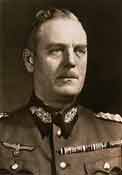Wilhelm Keitel
(1883 - 1946)

Unquestioning loyalty to the Kaiser had been the sacred watchword in the Keitel family household for generations. The traditionally conservative Prussian officer Wilhelm Keitel would practice the same unquestioning obedience towards Adolf Hitler - the supreme authority of Nazi Germany's fuehrer state.
Keitel rises rapidly through the ranks owing to his "outstanding talent for organizational and tactical duties," but "lacks any inner sovereignty of character." (Gorlitz, 140). Like so many other officers, he falls under Hitler's hypnotic spell. Because he is considered a perfect desk worker, Keitel finds himself chained to the immense bureaucratic duties incumbent upon him as Hitler's Chief of Staff at OKW. For this reason, he could rest assured that he had no willing competitors for his job.
Like many other officers, Keitel comes to believe in Hitler's genius and infalliblity when time and again "the greatest general of all time" [Keitel's words] proves the pessimists of the General Staff wrong with his conquests of Austria, the Sudetenland, the rest of Czechoslovakia, Poland, Denmark, Norway, the Low Countries, and above all France.
Keitel is among the twelve generals who receive their promotion to field marshal shortly after Germany's victory over France. Hitler also grants him 100,000 Reichmarks which greatly embarrasses Keitel causing him to transfer the money into a blocked account. Devoted to his duties, he takes his leave only once during the war in the summer of 1940.
The Wehrmacht's oath of Allegiance to the fuehrer compels Keitel to comply with directives (like the Comissar Order and Order for Guerrilla Warfare) that run against the grain of his conscience. Keitel never waivers in his loyalty, despite his belief that Hitler dishonored himself by committing suicide rather than standing trial and answering for his actions.
Keitel's belief in the fuehrer oath manifests itself above all on July 20, 1944. He is among the officers present in the conference hut when Stauffenberg's time-bomb explodes. His first thought is to rescue Hitler and on that pivotal afternoon he wages a ceaseless teletype campaign against the conspirators to rally all the military bases throughout the Reich. Despite the fact that Hitler is leading Germany towards total destruction, Keitel can never bring himself to understand Stauffenberg's July plot which he considers to be perfidy of the worst kind.
Keitel is captured by the Allies and tried for crimes against humanity at Nuremburg. Like the rest, he pleads not guilty to such charges claiming that all German officers and soldiers were legally bound to the sacred fuehrer oath which obligated them to execute orders. He claims in his defense that he had been opposed to such directives as the decision to attack Russia and the Commissar Order and that he had repeatedly asked Hitler's permission to be relieved of command - a request Hitler always refused given Keitel's indispensability as OKW Chief of Staff. He therefore could not abdicate his duties willingly as this constituted, in his mind, an act of disloyalty to the fuehrer, the army, and Germany. Keitel is nevertheless found guilty of aiding Hitler to commit a war agression, and of endorsing war crimes and crimes against humanity. His request to be shot by firing squad as befits his rank is denied. He is hanged in October 1946.
Sources: Joric Center


